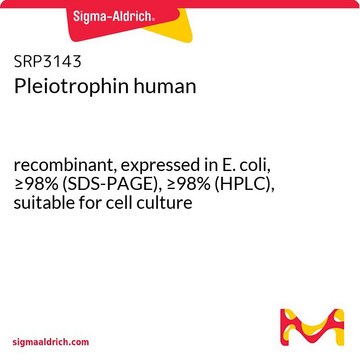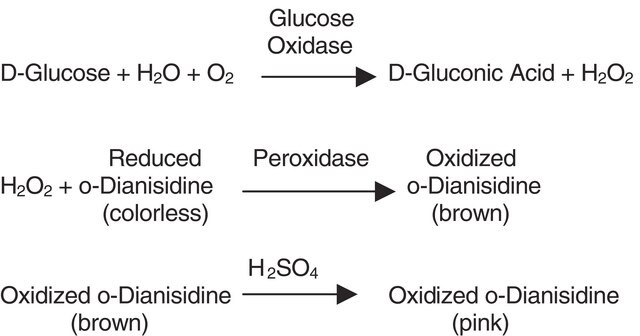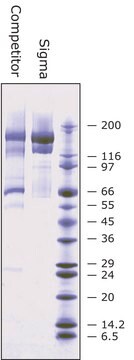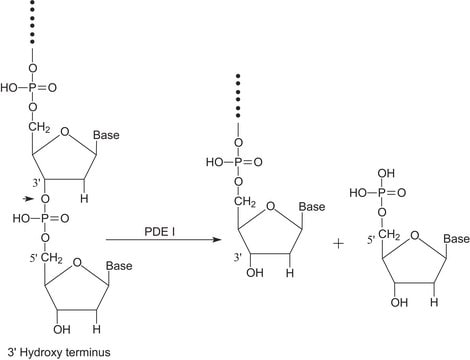P5333
Pleiotrophin human
≥97% (SDS-PAGE), recombinant, expressed in baculovirus infected Sf21 cells, lyophilized powder, suitable for cell culture
Synonym(s):
HARP, HB-GAM, Heparin affinity regulatory peptide, Heparin-binding growth factor, Heparin-binding growth-associated molecule, PTN
Sign Into View Organizational & Contract Pricing
All Photos(1)
About This Item
Recommended Products
biological source
human
Quality Level
recombinant
expressed in baculovirus infected Sf21 cells
Assay
≥97% (SDS-PAGE)
form
lyophilized powder
mol wt
predicted mol wt 15.3 kDa
packaging
pkg of 50 μg
storage condition
avoid repeated freeze/thaw cycles
technique(s)
cell culture | mammalian: suitable
impurities
endotoxin, tested
UniProt accession no.
storage temp.
−20°C
Gene Information
human ... PTN(5764)
General description
Pleiotrophin (PTN) is a multifunctional growth factor. The protein coded by the PTN gene is a member of the heparin-binding cytokines family. This gene is located on human chromosome 7. Pleiotrophin is also known as heparin-binding brain mitogen (HBBM), heparin-binding growth factor-8 (HBGF-8), heparin-binding growth-associated molecule (HB-GAM) and osteoblast-specific factor (OSF-1). This gene is highly expressed in brain, uterus, gut, muscle, lung and skin. Pleiotrophin mRNA is expressed in osteoblasts, chondrocytes, tumor cells, fibroblasts, astrocytes and Schwann cells.
Application
PTN is active in growth and development, and has mitogenic and neurite outgrowth activity. The gene for pleiotrophin is highly expressed in brain, uterus, gut, muscle, lung, and skin tissues
Biochem/physiol Actions
Pleiotrophin participates in growth and development. Pleiotrophin is mitogenic and displays neurite outgrowth activity. It stimulates tumor angiogenesis. There is extraordinary conservation between the amino acid sequences of bovine, human, and rat pleiotrophin.
Pleiotrophin may be the first member of a family of developmentally regulated cytokines. It is active in growth and development and the pleiotrophin gene is highly expressed in brain, uterus, gut, muscle, lung, and skin. Pleiotrophin mRNA is expressed in osteoblasts, chondrocytes, fibroblasts, astrocytes, Schwann cells, and tumor cells. Pleiotrophin is mitogenic and displays neurite outgrowth activity. It stimulates tumor angiogenesis. Pleiotrophin is also known as heparin-binding brain mitogen (HBBM), heparin-binding growth factor-8 (HBGF-8), heparin-binding growth-associated molecule (HB-GAM) and osteoblast-specific factor (OSF-1). There is extraordinary conservation between the amino acid sequences of bovine, human, and rat pleiotrophin.
Physical form
Lyophilized from a 0.2 μm filtered solution in phosphate buffered saline.
Analysis Note
The activity is measured in culture by the ability to enhance neurite outgrowth of cerebral cortical neurons from rat embryos.
Storage Class Code
11 - Combustible Solids
WGK
WGK 2
Flash Point(F)
Not applicable
Flash Point(C)
Not applicable
Personal Protective Equipment
dust mask type N95 (US), Eyeshields, Gloves
Choose from one of the most recent versions:
Already Own This Product?
Find documentation for the products that you have recently purchased in the Document Library.
Pleiotrophin expression during odontogenesis.
Erlandsen H, et al.
The Journal of Histochemistry and Cytochemistry, 60(5), 366-375 (2012)
N Maeda et al.
The Journal of cell biology, 142(1), 203-216 (1998-07-14)
Pleiotrophin/heparin-binding growth-associated molecule (HB-GAM) is a specific ligand of protein tyrosine phosphatase zeta (PTPzeta)/receptor-like protein tyrosine phosphatase beta (RPTPbeta) expressed in the brain as a chondroitin sulfate proteoglycan. Pleiotrophin and PTPzeta isoforms are localized along the radial glial fibers, a
Growth Factors
Principles of Tissue Engineering (2014)
The effects of pleiotrophin in proliferative vitreoretinopathy.
Ding X, et al.
Graefe'S Archive For Clinical and Experimental Ophthalmology = Albrecht Von Graefes Archiv Fur Klinische Und Experimentelle Ophthalmologie, 255(5), 873-884 (2017)
Pleiotrophin
Encyclopedia of Cancer (2017)
Our team of scientists has experience in all areas of research including Life Science, Material Science, Chemical Synthesis, Chromatography, Analytical and many others.
Contact Technical Service






